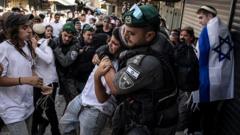In a troubling display of nationalism, crowds of far-right Israelis rallied in Jerusalem on Monday to commemorate Jerusalem Day, marking the city's capture during the 1967 Arab-Israeli conflict. The atmosphere quickly soured as marchers chanted hateful slogans, including "death to Arabs," and engaged in violent confrontations with Palestinian passersby.
Israeli police were called in as tensions rose near the bustling Damascus Gate, a historically significant entrance to the Old City. Reports indicated that numerous Arab traders were harassed by aggressive marchers, while right-wing activists displayed provocative banners asserting claims over the Palestinian territories, reading “67 - Jerusalem in our hands; 2025 - Gaza in our hands.” Witness photos captured moments where police detained several violent demonstrators as the situation escalated.
Prominent political figures condemned the events, highlighting the march’s descent into a platform for "hatred and racism." Opposition Leader Yair Lapid referred to the actions of the marchers as “a disgrace and an insult to Judaism,” urging a collective effort to promote peace among diverse communities. Similarly, Left-wing leader Yair Golan denounced the hostility, asserting, “This is what hatred, racism, and bullying look like,” and reaffirmed a commitment to combat this palpable division.
The polemic march coincided with ongoing military conflicts in Gaza, following the deadly Hamas attacks on October 7, during which approximately 1,200 individuals were killed. Yair Lapid pointed out the staggering civilian toll, noting the numerous casualties in Gaza since Israel’s military operations commenced.
Israeli Prime Minister Benjamin Netanyahu responded during a morning cabinet meeting, emphasizing his commitment to keeping Jerusalem as a united city under Israeli governance, dismissing growing calls for dialogue regarding the city’s contested status. As this cycle of violence continues, the need for peaceful coexistence and dialogue remains urgent amid escalating tensions between communities in the region.
Israeli police were called in as tensions rose near the bustling Damascus Gate, a historically significant entrance to the Old City. Reports indicated that numerous Arab traders were harassed by aggressive marchers, while right-wing activists displayed provocative banners asserting claims over the Palestinian territories, reading “67 - Jerusalem in our hands; 2025 - Gaza in our hands.” Witness photos captured moments where police detained several violent demonstrators as the situation escalated.
Prominent political figures condemned the events, highlighting the march’s descent into a platform for "hatred and racism." Opposition Leader Yair Lapid referred to the actions of the marchers as “a disgrace and an insult to Judaism,” urging a collective effort to promote peace among diverse communities. Similarly, Left-wing leader Yair Golan denounced the hostility, asserting, “This is what hatred, racism, and bullying look like,” and reaffirmed a commitment to combat this palpable division.
The polemic march coincided with ongoing military conflicts in Gaza, following the deadly Hamas attacks on October 7, during which approximately 1,200 individuals were killed. Yair Lapid pointed out the staggering civilian toll, noting the numerous casualties in Gaza since Israel’s military operations commenced.
Israeli Prime Minister Benjamin Netanyahu responded during a morning cabinet meeting, emphasizing his commitment to keeping Jerusalem as a united city under Israeli governance, dismissing growing calls for dialogue regarding the city’s contested status. As this cycle of violence continues, the need for peaceful coexistence and dialogue remains urgent amid escalating tensions between communities in the region.

















